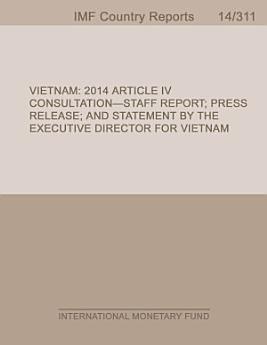Vietnam: Staff Report for the 2014 Article IV Consultation
International Monetary Fund. Asia and Pacific Dept
Oct 2014 · International Monetary Fund
Ebook
58
Pages
reportRatings and reviews aren’t verified Learn More
About this ebook
KEY ISSUES Context. Economic performance has improved over the last year. The recovery is taking hold, although domestic activity remains weak, in part constrained by weak banks and inefficient state-owned enterprises (SOEs). Inflation has declined, the current account remains in large surplus, and international reserves have increased. The authorities place a priority on preserving macroeconomic stability, tackling banking sector vulnerabilities, and reforming SOEs, though implementation has been gradual in some key areas. Outlook and risks. Growth is projected to recover gradually over the coming years, with the current account returning to a deficit and inflation contained. On current policies, public debt is projected to reach 60 percent of GDP. Risks include weaker trading partner growth, geopolitical tensions, slow structural reforms, and delayed fiscal consolidation. Early conclusion to key trade negotiations would be growth-positive. Fiscal policy. Deficits have been sizable and rising public debt requires attention. A medium-term growth-friendly consolidation is recommended, based on enhancing revenue and rationalizing unproductive expenditures while preserving crucial social and capital spending. This would ensure public debt sustainability with space to address contingent liabilities from banking sector and SOE restructuring. Monetary and exchange rate policy. The current monetary policy stance is appropriate. Greater exchange rate flexibility would help buffer external shocks, facilitate improved reserve adequacy, and help lay the groundwork for shifting toward using inflation as a nominal anchor over the medium term. Banking sector reform. Several policy measures have been taken recently, but the overall gradual approach will likely continue constraining credit growth and keep the system susceptible to shocks and significant asset deterioration. A more expeditious recognition of nonperforming loans, bank restructuring and orderly resolution would support robust credit creation and macro-financial stability. State-owned enterprise reform. Progress is being made. Implementing restructuring plans and accelerating equitization would help ensure more efficient resource allocation, strengthen banks, and deliver higher future growth. Reform should also focus on strengthening corporate governance and ensuring a level playing field.
Rate this ebook
Tell us what you think.
Reading information
Smartphones and tablets
Install the Google Play Books app for Android and iPad/iPhone. It syncs automatically with your account and allows you to read online or offline wherever you are.
Laptops and computers
You can listen to audiobooks purchased on Google Play using your computer's web browser.
eReaders and other devices
To read on e-ink devices like Kobo eReaders, you'll need to download a file and transfer it to your device. Follow the detailed Help Center instructions to transfer the files to supported eReaders.








